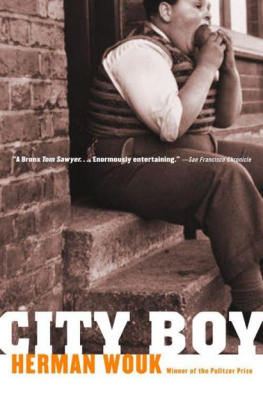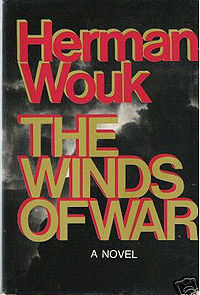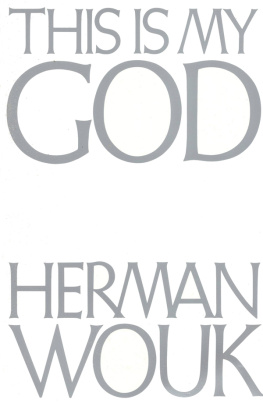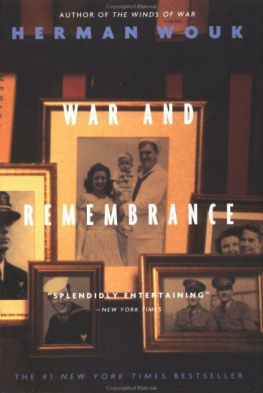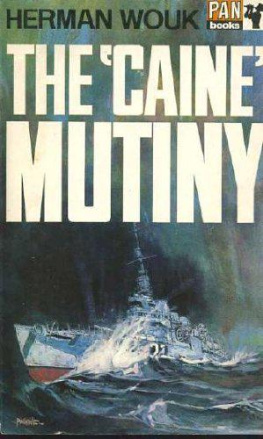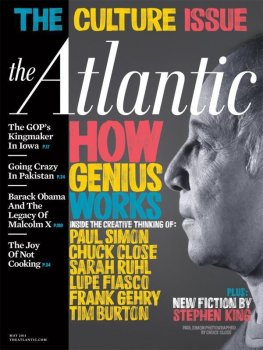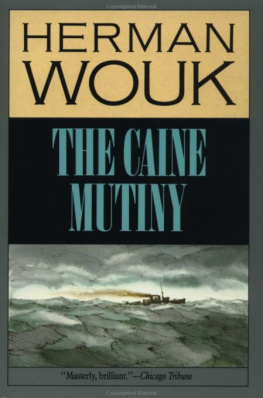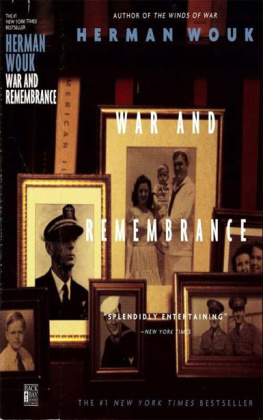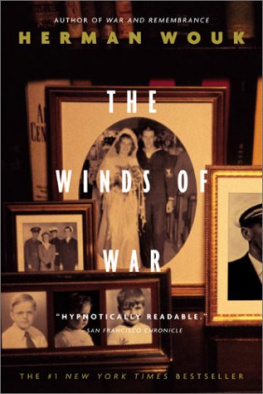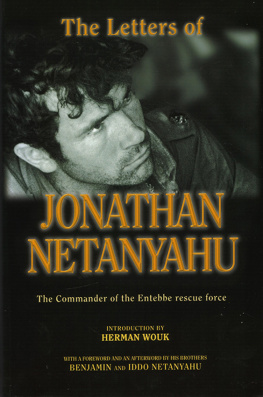Herman Wouk - City Boy
Here you can read online Herman Wouk - City Boy full text of the book (entire story) in english for free. Download pdf and epub, get meaning, cover and reviews about this ebook. year: 1992, publisher: Back Bay Books, genre: Detective and thriller. Description of the work, (preface) as well as reviews are available. Best literature library LitArk.com created for fans of good reading and offers a wide selection of genres:
Romance novel
Science fiction
Adventure
Detective
Science
History
Home and family
Prose
Art
Politics
Computer
Non-fiction
Religion
Business
Children
Humor
Choose a favorite category and find really read worthwhile books. Enjoy immersion in the world of imagination, feel the emotions of the characters or learn something new for yourself, make an fascinating discovery.
- Book:City Boy
- Author:
- Publisher:Back Bay Books
- Genre:
- Year:1992
- Rating:4 / 5
- Favourites:Add to favourites
- Your mark:
- 80
- 1
- 2
- 3
- 4
- 5
City Boy: summary, description and annotation
We offer to read an annotation, description, summary or preface (depends on what the author of the book "City Boy" wrote himself). If you haven't found the necessary information about the book — write in the comments, we will try to find it.
City Boy — read online for free the complete book (whole text) full work
Below is the text of the book, divided by pages. System saving the place of the last page read, allows you to conveniently read the book "City Boy" online for free, without having to search again every time where you left off. Put a bookmark, and you can go to the page where you finished reading at any time.
Font size:
Interval:
Bookmark:
Copyright 1948, 1952, 1969 by Herman Wouk
Copyright renewed 1975 by Herman Wouk
Preface copyright 2004 by Herman Wouk
Foreword copyright renewed 1980 by John P. Marquand Jr.
All rights reserved. No part of this book may be reproduced in any form or by any electronic or mechanical means, including information storage and retrieval systems, without permission in writing from the publisher, except by a reviewer who may quote brief passages in a review.
Back Bay Books / Little, Brown and Company
Hachette Book Group
237 Park Avenue, New York, NY 10017
Visit our website at www.HachetteBookGroup.com.
First eBook Edition: June 2009
ISBN: 978-0-316-07700-2
Contents
Novels
Aurora Dawn
City Boy
The Caine Mutiny
Marjorie Morningstar
Youngblood Hawke
Don't Stop the Carnival
The Winds of War
War and Remembrance
Inside, Outside
The Hope
The Glory
A Hole in Texas
Plays
The Traitor
The Caine Mutiny Court-Martial
Nature's Way
Nonfiction
This Is My God
The Will to Live On
This story is dedicated to my motherCITY BOY:The Adventures of Herbie Bookbinder
C ity Boy, my second novel, was published in 1948. I had no reason to think then that the book would survive its season, let alone more than half a century. None of my novels ever had a less promising start.
Just a year earlier, I had entered the American literary frogpond with a noisy splash, and before that I had never published so much as a short story in a magazine. For my livelihood until World War II, I had been a script writer for the great radio comedian Fred Allen. My first novel, Aurora Dawn, was a facetious spoof of commercial radio, and the little book caught a publisher's fancy, so he launched it with a blast of ecstatic advertising. In quick obedience to Newton's third law, critics blasted back. All this dazed me. A naval reserve officer, I had written most of Aurora Dawn aboard a minesweeper in the South Pacific, to while away boring wartime hours at sea. I did not know enough about the literary world to object to the overblown launching, nor to expect the boisterous counter-attack. It was quite a debut. When the dust settled I had in hand a Book-of-the-Month selection of my first novel, a so-so sale, and a literary reputation demolished before it was built. New authors, fuming over insufficient advertising of their masterpieces, might ponder this true tale.
But there I was, a professional novelist, if a somewhat black-and-blue one. I wrote City Boy, and found real delight in the task. To this day the fat little hero, Herbie Bookbinder, remains one of my favorite creations. But my publisher, set back by the critics' onslaught on Aurora Dawn, and probably convinced that no novel with Jewish characters could sell anywaythis was gospel back then in the book tradelaunched the work as one buries a body at sea. City Boy slid off the plank, and with scarcely a ripple went bubbling down. No club selected the book. Nobody bought it. Almost nobody reviewed it. The remainder shops were piled with this novel, while I was still reading scattered out-of-town notices. End of poor Herbie, to all appearances.
Alas! Total disaster with a second book; a very usual thing. Still, I now had a family, and I had come to love the fiction art. I thought I had better have one more shot at the target. I started another novel. My habit was, and still is, to read my work chapter by chapter to a discerning, lovely, but taciturn wife. Once she suddenly remarked, when I was reading aloud an early scene in that story, If they don't like this one, you had better try some other line of business. The book was The Caine Mutiny.
Meantime Aurora Dawn and City Boy had gone out of print, but I had a new publisher, who liked the books and brought them back to light. That was about forty-five years ago. Aurora Dawn remains in print, and the publishing history of City Boy since then records successive new editions, translations into several languages, club selections, and usage in school textbooks and anthologies. In the arts, as in most risky walks of life, the good word is never say die.
My life goal of authorship was fixed when I first read Tom Sawyer at eleven, and my working title for City Boy was Tom of the Bronx. I grew up in a Bronx neighborhood that later became notorious as Fort Apache, but in my boyhood there were idyllic green spaces called lots, and more than a trace of the golden light of Hannibal, Missouri, fell on those stony neighborhoods. That glow was what I tried to capture in City Boy. Without taking the comparison further, I hope that Herbie and his tantalizing Lucille still come to life in their modest citified way, as Tom and Becky Thatcher will do in Mark Twain's book while the English language lasts.
Herman Wouk
O n a golden May morning in the sixth year of Calvin Coolidge's presidency, a stout little dark-haired boy named Herbert Bookbinder, dressed in a white shirt, a blue tie and gray knee breeches, sat at a desk in Public School 50 in the Bronx, suffering the pain of a broken heart. On the blackboard before his eyes were words that told a disaster:
Mrs. Mortiner Gorkin
The teacher of Class 7B-1 had just informed her pupils that they must call her Miss Vernon no more. Turning to the board with a shy smile, she had written her new name in rounded chalk letters, and had blushed through a minute's tumult of squeals and giggles from the girls and good-natured jeers from the boys. Then Mrs. Gorkin stilled the noise with an upraised hand. She pulled down into view a map of Africa rolled up at the top of the blackboard like a window shade, and the class, refreshed by the brief lawbreaking, listened eagerly to her tale of the resources of the Congo. But Herbert could not rouse himself to an interest in rubber, gold, apes, and ivory; not when the lost Diana Vernon was talking about them. The tones of her voice made him too unhappy.
The anodyne in this boy's life was food. No anguish was so sharp that eating could not allay it. Unfortunately lunch time was half an hour off. His hand groped softly into his desk and rested on a brown paper bag. He felt the familiar outlines of two rolls (today was Mondaylettuce and tomato sandwiches) and an apple. Then his hand encountered something small and oval. With practiced, noiseless fingers he opened the bag, unwrapped some twisted wax paper, and drew out a peeled hardboiled egg. This was a pretty dry morsel without salt and bread and butter, but the boy popped the whole egg into his mouth and chewed it moodily. Like an aspirin, it dulled the pain without improving his spirits. He was aware that his cheeks bulged, but he did not care. Let her catch him! He was her favorite, first on the honor roll, and she could not humiliate him without humiliating herself more. The boy's calculation was correct. Mrs. Gorkin did see him eating, but she ignored it.
In time a beautiful sound rang outfreedom, proclaimed by the clanging of the gong for lunch. At a nod from Mrs. Gorkin, the children who had worrisome mothers ran to a shallow closet and returned to their seats wearing coats, while those who had braved the changeable May weather without coats sat back and gloried in their maturity. A second time the gong sounded. The pupils stood and quietly began to form a double line at the front of the room. Herbie, on his way to the head of the line, passed the teacher's desk. She whispered, Remain behind, Herbert. Pretending to have heard nothing, Herbie strolled back to his desk and remained there fussing busily until the class marched out.
Next pageFont size:
Interval:
Bookmark:
Similar books «City Boy»
Look at similar books to City Boy. We have selected literature similar in name and meaning in the hope of providing readers with more options to find new, interesting, not yet read works.
Discussion, reviews of the book City Boy and just readers' own opinions. Leave your comments, write what you think about the work, its meaning or the main characters. Specify what exactly you liked and what you didn't like, and why you think so.

